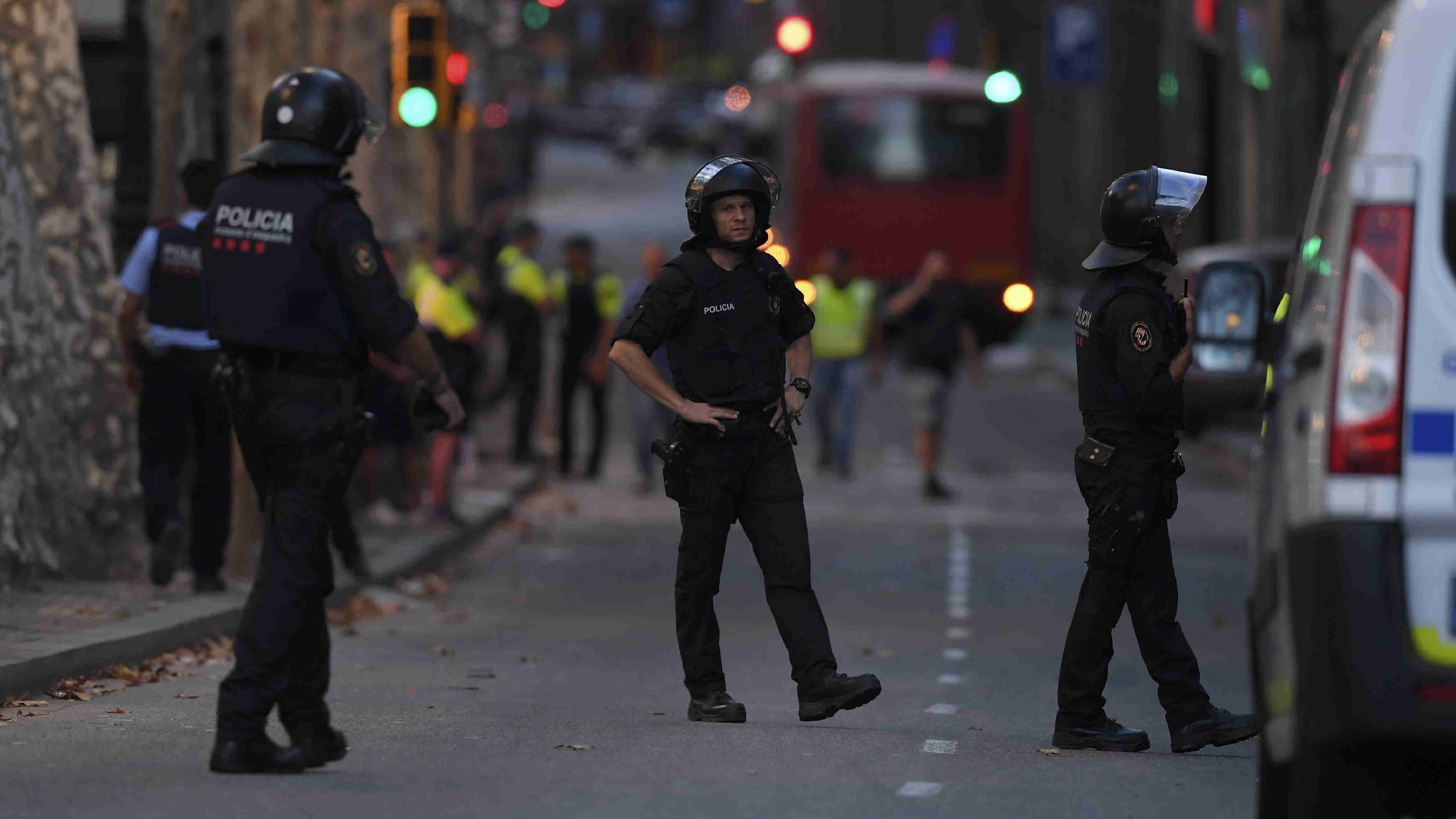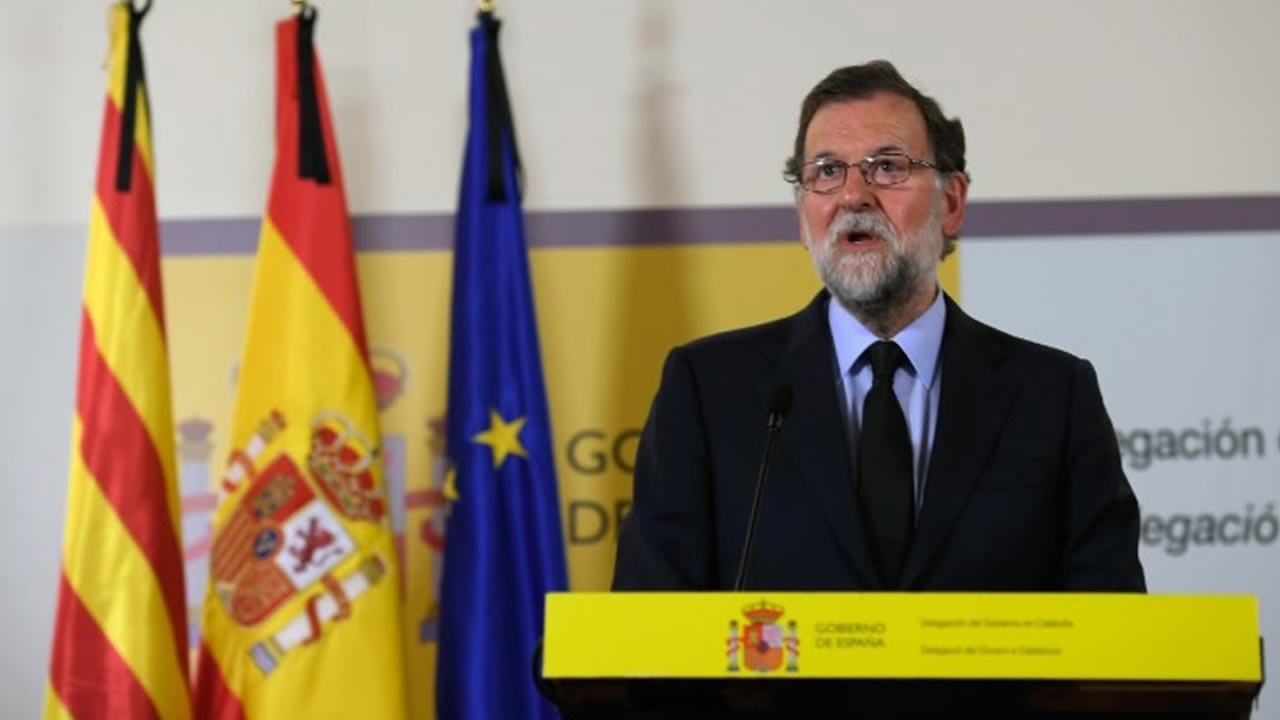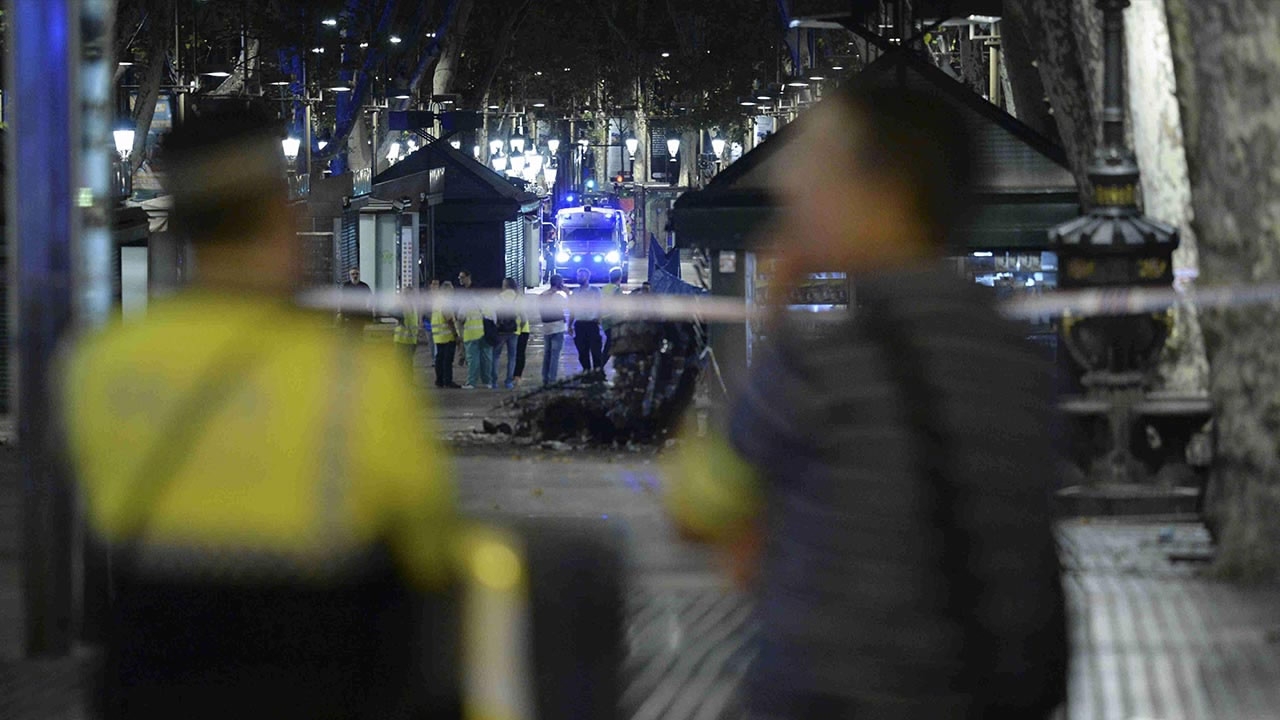Spain mounted a sweeping anti-terror operation on Friday after a suspected Islamist militant drove a van into crowds in Barcelona, killing 14 people and injuring 130 others before fleeing, in what police suspect was one of multiple planned attacks.
What happened?
Around 4:50 pm (1450 GMT) on Thursday, August 17, a vehicle plowed into a crowd of pedestrians on the famous Las Ramblas boulevard in Barcelona.
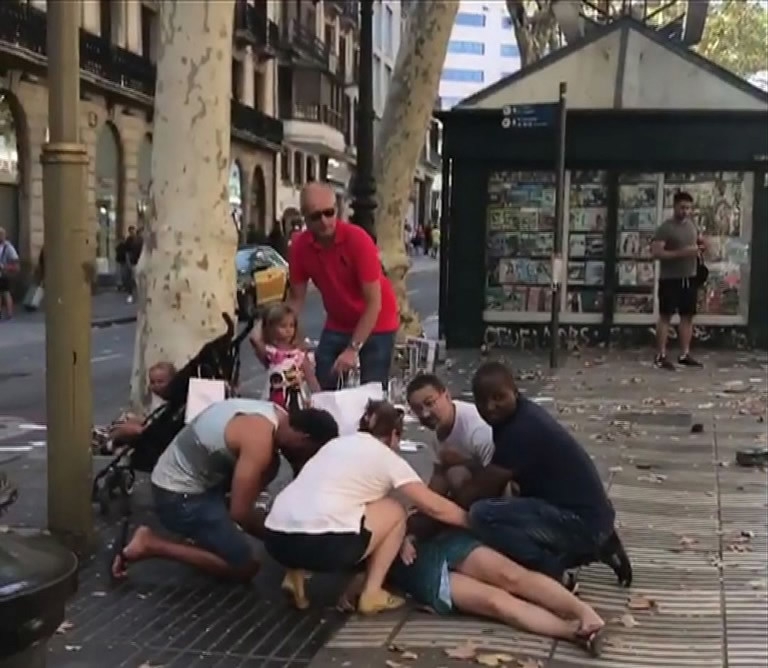
This video grab obtained on August 17, 2017 from Instagram account @carlos_tg_32_ shows people tending to an injured woman after a van ploughed into the crowd. /AFP Photo
This video grab obtained on August 17, 2017 from Instagram account @carlos_tg_32_ shows people tending to an injured woman after a van ploughed into the crowd. /AFP Photo
The promenade in the heart of the city center is one of Barcelona's busiest streets, normally filled with tourists and street performers until well into the night.
Witnesses described scenes of chaos and panic, with bodies strewn along the boulevard as others fled for their lives.
"When it happened I ran out and saw the damage," local shop worker Xavi Perez told Agence France-Presse.
"There were bodies on the ground with people crowding round them. People were crying. There were lots of foreigners."
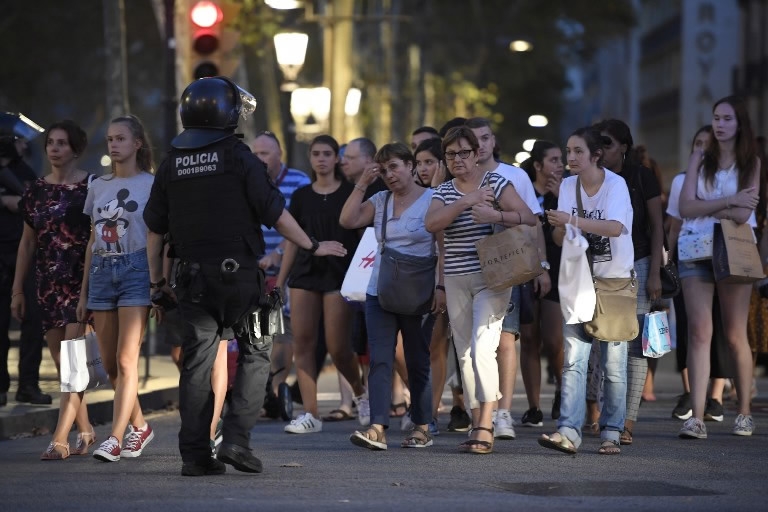
A policeman accompanies clients of a store outside a cordoned off area after a van ploughed into the crowd, killing 13 persons and injuring over 100 on the Rambla in Barcelona on August 17, 2017. /AFP Photo
A policeman accompanies clients of a store outside a cordoned off area after a van ploughed into the crowd, killing 13 persons and injuring over 100 on the Rambla in Barcelona on August 17, 2017. /AFP Photo
As security forces hunted for the Barcelona van's driver who was seen escaping on foot, some eight hours later, police said they had killed five attackers on Thursday night in Cambrils, a town 120 kilometers south of Barcelona, to thwart a "terrorist attack" using explosive belts.
Six civilians, one of them in critical condition. and a police officer were injured in the operation.
Who are the victims?
Regional interior minister Joaquim Forn said at least 13 people had died and around 100 more were injured in the Barcelona attack.
There were at least 18 nationalities among the Barcelona victims who came from countries as varied as France, Venezuela, Australia, Ireland, Peru, Algeria and China, according to Spain's civil protection agency.
Belgium said one of its citizens had died, The Hague said three Dutch were injured and a Greek diplomat reported three nationals had been wounded – a woman and her two children.
What leads is the investigation pursuing?
Witnesses to the van attack said the white vehicle had zigzagged at high speed down Las Ramblas, ramming pedestrians and cyclists, sending some hurtling through the air and leaving bodies strewn in its wake.
Police said Thursday that one of the arrested suspects in the Barcelona attack was a Spaniard born in Melilla, a Spanish territory on Morocco's north coast, and the other a Moroccan named as Driss Oukabir.
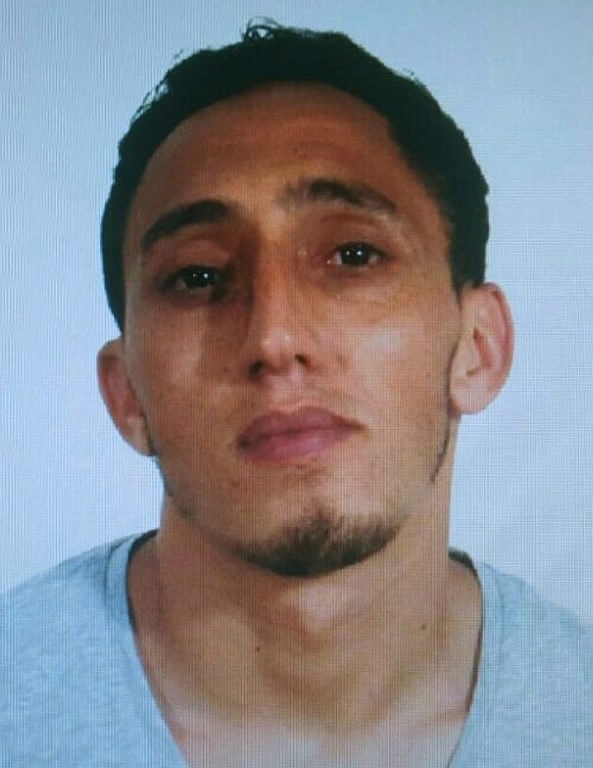
A handout picture provided by the Spanish National Police shows Moroccan Driss Oukabir, alleged suspect linked to the attack of Barcelona on August 17, 2017. /AFP Photo
A handout picture provided by the Spanish National Police shows Moroccan Driss Oukabir, alleged suspect linked to the attack of Barcelona on August 17, 2017. /AFP Photo
The Spaniard was arrested in Alcanar, about 200 kilometres south of Barcelona, at the scene of an explosion in a house late Wednesday that left one person dead and seven wounded and is believed to be linked to Thursday's assault.
Catalan police confirmed on Twitter that "a third person has been detained in Ripoll in relation to the attacks,"
Police shot dead four of the Cambrils attackers and a fifth later died of his injuries. They said they were "working on the hypothesis that the terrorists shot dead in Cambrils are linked to what happened in Barcelona".
The investigation is still ongoing.
Who is responsible?
ISIL's Amaq news agency said: "The perpetrators of the Barcelona attack are soldiers of the Islamic State and carried out the operation in response to calls for targeting coalition states" - a reference to a US-led coalition against the Sunni militant group.
The ISIL claim could not immediately be verified. If the involvement of ISIL militants is confirmed, it would be the latest in a string of attacks in the past 13 months in which they have used vehicles to bring carnage to the streets of European cities.
How the world is reacting?
Chinese President Xi Jinping sent a message of condolence to King Felipe VI of Spain saying China opposes terrorism in all forms and is ready to work with the international community, including Spain, to strengthen anti-terror cooperation so as to jointly safeguard regional and world peace and stability.
Spanish Prime Minister Mariano Rajoy announced three days of official mourning for what he called a "jihadist attack."
The Spanish royal household said on Twitter: “They are murderers, nothing more than criminals who are not going to terrorise us. All of Spain is Barcelona.”
The United Nations Security Council condemned "in the strongest terms" Thursday's terrorist attack and expressed their deep sympathy and condolences to the families of the victims, as well as to the government of Spain. They wished a speedy recovery to those injured, a UNSC statement said.
US President Donald Trump said: "The United States condemns the terror attack in Barcelona, Spain, and will do whatever is necessary to help." He added: "Be tough & strong, we love you!"
German Chancellor Angela Merkel called the attack in Barcelona, "revolting," according to her spokesman.
French President Emmanuel Macron, whose nation has suffered some of Europe's deadliest militant attacks in recent years, tweeted: "All my thoughts and France's solidarity to the victims of the tragic attack in Barcelona."
Using vehicles as weapons
This modus operandi - crude, deadly and very hard to prevent - has killed well over 100 people in Nice, Berlin, London and Stockholm.
- Paris, France, August 9, 2017, an Algerian drives a BMW into soldiers outside a barracks in the western Paris suburb of Levallois-Perret, injuring six.
- London, UK, June 19, 2017, a man drives into a crowd of Muslim worshippers near a mosque in London's Finsbury Park area killing one, injuring 11 others.
- London, UK, June 3, three attackers strike pedestrians with a van and go on a stabbing spree, killing eight people.
- Stockholm, Sweden, April 7, 2017, an Uzbek drives a truck attack in the Swedish capital, killing five people, including an 11-year-old Swedish girl, a Briton, and one Belgian, injuring fifteen others.
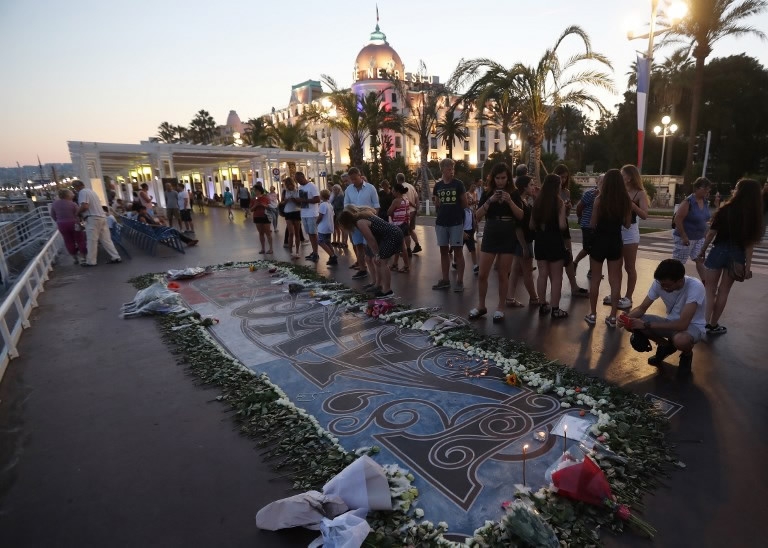
People gather around a makeshift memorial on July 14, 2017 on the "Promenade des Anglais" in Nice, southern France, after a commemorative ceremony marking the first anniversary of a jihadist truck attack which killed 86 people on Bastille Day 2016. /AFP Photo
People gather around a makeshift memorial on July 14, 2017 on the "Promenade des Anglais" in Nice, southern France, after a commemorative ceremony marking the first anniversary of a jihadist truck attack which killed 86 people on Bastille Day 2016. /AFP Photo
- London, UK, March 22, 2017, a British mows down pedestrians on Westminster Bridge near parliament and stabs a policeman, killing five people and injuring around 50 before being shot dead by police.
- Berlin, Germany, December 19, 2016, a Tunisian slams into a crowd of people at a Christmas market in Berlin, killing 12 people and injuring 48.
- Nice, France, July 14, 2016, a Tunisian ploughs a 19-tonne truck into a Bastille Day crowd on the Promenade des Anglais, killing 86 people.
The incident took place at the height of the tourist season in Barcelona, which is one of Europe's top travel destinations with at least 11 million visitors a year.
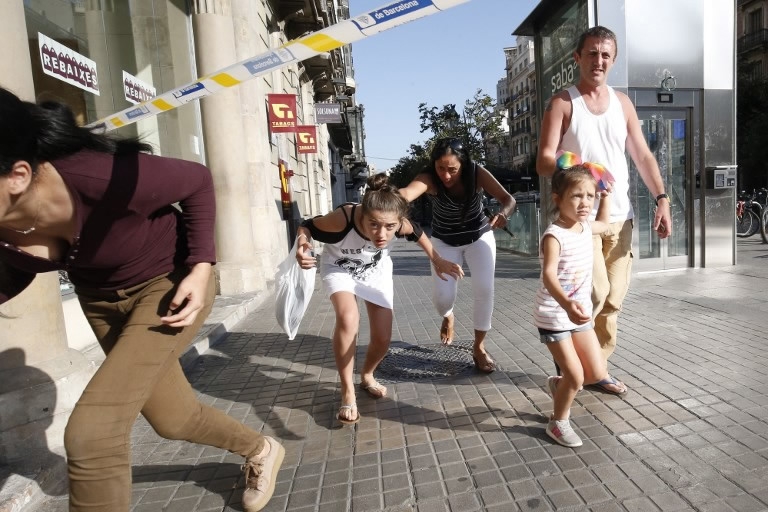
People leave a cordoned off area after a van ploughed into the crowd, killing one person and injuring several others on the Rambla in Barcelona on August 17, 2017. /AFP Photo
People leave a cordoned off area after a van ploughed into the crowd, killing one person and injuring several others on the Rambla in Barcelona on August 17, 2017. /AFP Photo
Barcelona is the capital of the wealthy northeastern region of Catalonia, which plans to hold a popular vote on Oct. 1 on whether it should secede from Spain. The central government says the vote cannot go ahead because it is unconstitutional.
Before Thursday's attack, government data showed that police had arrested 11 suspected jihadists in the Barcelona area so far this year, more than anywhere else in Spain.
Source(s): AFP
,Reuters

